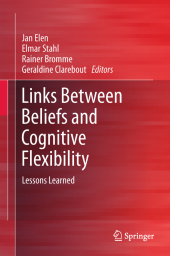 Neuerscheinungen 2014Stand: 2020-02-01 |
Schnellsuche
ISBN/Stichwort/Autor
|
Herderstraße 10
10625 Berlin
Tel.: 030 315 714 16
Fax 030 315 714 14
info@buchspektrum.de |

Rainer Bromme, Geraldine Clarebout, Jan Elen, Elmar Stahl
(Beteiligte)
Links Between Beliefs and Cognitive Flexibility
Lessons Learned
Herausgegeben von Elen, Jan; Stahl, Elmar; Bromme, Rainer; Clarebout, Geraldine
2011. 2014. viii, 213 S. 235 mm
Verlag/Jahr: SPRINGER NETHERLANDS; SPRINGER 2014
ISBN: 9400796137 (9400796137)
Neue ISBN: 978-9400796133 (9789400796133)
Preis und Lieferzeit: Bitte klicken
Cognitive flexibility presupposes an inclusive response to input from varied sources when engaged in problem-solving. The contributions in this volume analyze the nature of cognitive flexibility, as well as the impact of different types of beliefs on it.
With the world and its structures becoming ever more complex, and the nature of future employment becoming ever more unpredictable, the notion of ´cognitive flexibility´ has a high profile in educational and psychological debate. The contributions in this volume analyze the nature of cognitive flexibility, as well as the impact of different types of beliefs on cognitive flexibility.
Making adequate decisions requires considering input from a variety of continuously evolving sources rather than adhering to predetermined procedures. Adopting a position in a debate necessitates the critical evaluation of different alternatives, while solving a problem entails selecting appropriate problem-solving strategies. Meanwhile, studying requires students to integrate a range of interventions, and treating a patient involves making a differential diagnosis. The common factor, cognitive flexibility, lies at the core of effective functioning in complex, domain-specific environments.
Cognitive flexibility can be described as the disposition to consider diverse information elements while deciding on how to solve a problem or to execute a learning-related task in a variety of domains. The concept of ´disposition´ implies that individuals will not always demonstrate cognitive flexibility even if they are in principle able to act in a cognitively flexible way. The notion does not require that alternatives are always deliberately considered, which is why this volume´s tandem discussion of beliefs is key element of the discussion. Beliefs play a central role in cognitive flexibility and relate to what individuals consider to be important, valid and/or true. Of specific interest is the relationship between epistemological beliefs and cognitive flexibility, especially as a particular subset of epistemological beliefs seems to be a prerequisite to a cognitively flexible disposition.
Chapter 1 Personal Epistemology: Nomenclature, Conceptualizations, and Measurement Jeremy Briell, Jan Elen, Lieven Verschaffel, & Geraldine Clarebout
Chapter 2 The Generative Nature of Epistemological Judgments: Focusing on Interactions Instead of Elements to Understand the Relationship between Epistemological Beliefs and Cognitive Flexibility Elmar Stahl
Chapter 3 Spontaneous Cognitive Flexibility and an Encompassing System of Epistemological Beliefs Marlene Schommer-Aikins
Chapter 4 Personal Epistemology and Philosophical Epistemology The View of a Philosopher Richard F. Kitchener
Chapter 5: Beliefs about Abilities and Epistemic Beliefs Aspects of Cognitive Flexibility in Information-Rich Environments Dorothe Kienhues and Rainer Bromme
Chapter 6
Cognitive Flexibility and Epistemic Validation in Learning from Multiple Texts Tobias Richter
Chapter 7
Development of Cognitive Flexibility and Epistemological Understanding in Argumentation Beate Sodian and Petra Barchfeld
Chapter 8
Medical Trainees´ Epistemological Beliefs and Their Cognitive Flexibility Ann Roex, Jan Degryse and Geraldine Clarebout
Chapter 9
Analysing and Developing Strategy Flexibility in Mathematics Education Lieven Verschaffel, Koen Luwel, Joke Torbeyns, and Wim Van Dooren
Chapter 10 Conclusion Geraldine Clarebout, Rainer Bromme, Elmar Stahl, and Jan Elen


